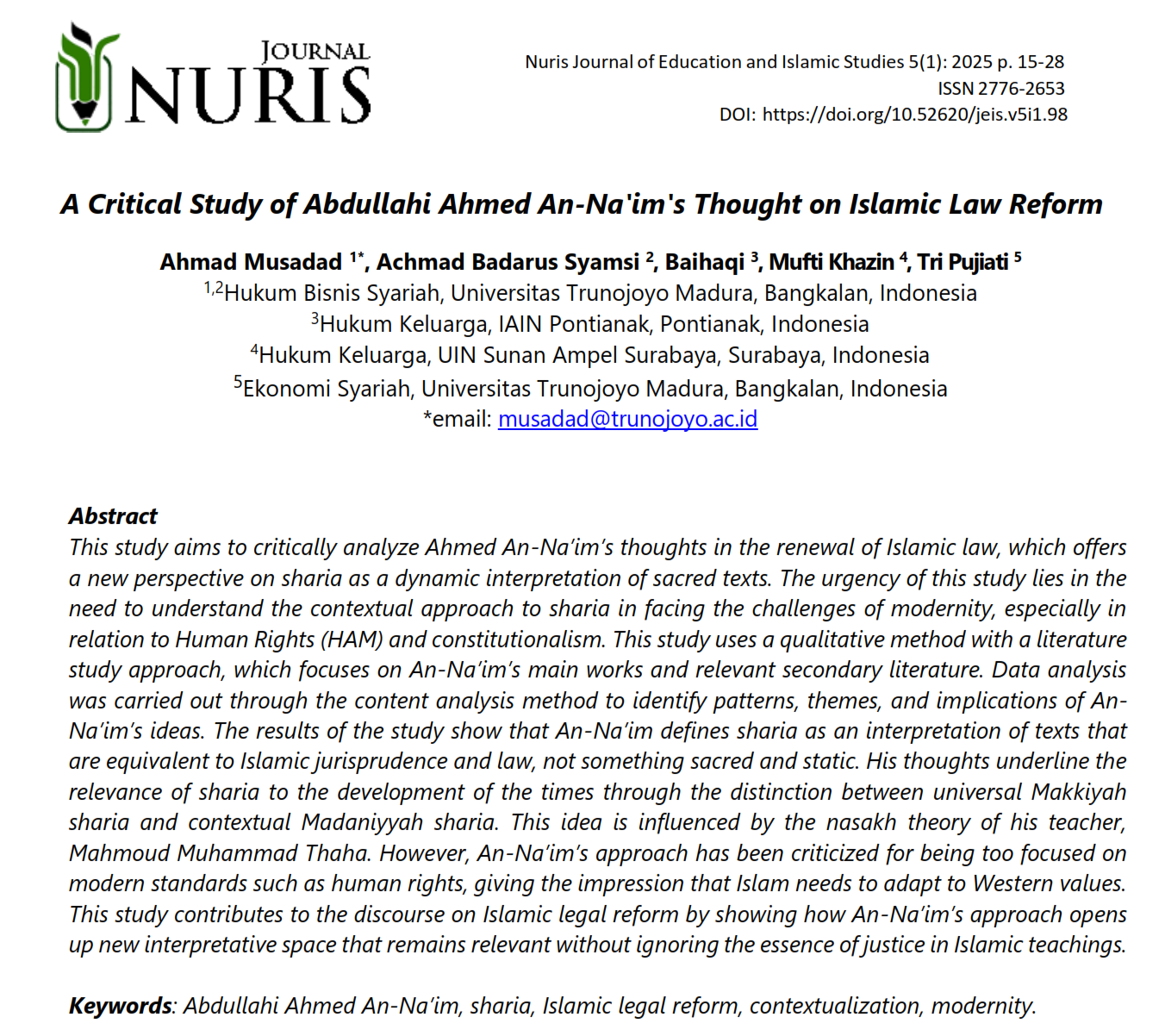A Critical Study of Abdullahi Ahmed An-Na'im's Thought on Islamic Law Reform
Main Article Content
Abstract
This study aims to critically analyze Ahmed An-Na’im’s thoughts in the renewal of Islamic law, which offers a new perspective on sharia as a dynamic interpretation of sacred texts. The urgency of this study lies in the need to understand the contextual approach to sharia in facing the challenges of modernity, especially in relation to Human Rights (HAM) and constitutionalism. This study uses a qualitative method with a literature study approach, which focuses on An-Na’im’s main works and relevant secondary literature. Data analysis was carried out through the content analysis method to identify patterns, themes, and implications of An-Na’im’s ideas. The results of the study show that An-Na’im defines sharia as an interpretation of texts that are equivalent to Islamic jurisprudence and law, not something sacred and static. His thoughts underline the relevance of sharia to the development of the times through the distinction between universal Makkiyah sharia and contextual Madaniyyah sharia. This idea is influenced by the nasakh theory of his teacher, Mahmoud Muhammad Thaha. However, An-Na’im’s approach has been criticized for being too focused on modern standards such as human rights, giving the impression that Islam needs to adapt to Western values. This study contributes to the discourse on Islamic legal reform by showing how An-Na’im’s approach opens up new interpretative space that remains relevant without ignoring the essence of justice in Islamic teachings
Downloads
Metrics
Article Details

This work is licensed under a Creative Commons Attribution 4.0 International License.
License Terms
In submitting the manuscript to the journal, the authors certify that:
- They are authorized by their co-authors to enter into these arrangements.
- The work described has not been formally published before, except in the form of an abstract or as part of a published lecture, review, thesis, or overlay journal.
- That it is not under consideration for publication elsewhere,
- That its publication has been approved by all the author(s) and by the responsible authorities – tacitly or explicitly – of the institutes where the work has been carried out.
- They secure the right to reproduce any material that has already been published or copyrighted elsewhere.
- They agree to the following license and copyright agreement.
References
Abdurrahman Usman, Z., & Hasbi, B. (2022). Neo-Sekularisme dalam Pemikiran Abdullahi Ahmed an-Naim: Studi tentang Relasi Islam dan Negara. Politea, 5(1), 58. https://doi.org/10.21043/politea.v5i1.13688
Al-Qaththan, M. (n.d.). Mabahits fi ‘Ulum al-Qur’an. Mansyurat al-‘Ashr al-Hadits.
An-Na‘im, A. A. (2003). Muslim Harus Menyadari Tidak ada yang Magis dalam Konsep Hak Asasi Manusia. In D. van der Meij (Ed.), Dinamika Kontemporer dalam Masyarakat Islam (hal. 166–176). INIS.
An-Na’im, A. A. (1988). Mahmud Muhammad Taha and Crisis in Islamic Law Reform Implications for Interreligious Relations. Journal of Ecunemical Studies, 25(1), 1–21.
An-Na’im, A. A. (1990). Toward an Islamic Reformation: Civil Liberties, Human Right, and International Law. Syracuse University Press.
An-Na’im, A. A. (1997). Dekonstruksi Syariah: Wacana Kebebasan Sipil, Hak Asasi Manusia dan Hubungan Internasional dalam Islam. LKiS.
Anshori, M. (2019). Wawasan Baru Kajian Nasikh-Mansukh: Analisis Pemikiran Maḥmūd Ṭāhā dan Abdullahi Ahmed An-Naim. In Jurnal At-Tibyan: Jurnal Ilmu Alqur’an dan Tafsir (Vol. 4, Nomor 2, hal. 246–267). https://doi.org/10.32505/tibyan.v4i2.899
As-Suyuthi, I. J. (1967). Al-Itqan fi ‘Ulum al-Qur’an. Dar al-Turats.
Cahyanti, P. (2017). Analisis Konflik Sudan dan Sudan Selatan. Journal of International Relations, 3(4), 84–95.
Dahlan, M. (2009). Abdullah Ahmed an-Naim: Epistimologi Hukum Islam. Pustaka Pelajar.
Dursun, H. R. (2023). Khayr al-Din al-Tunisi and Islamic Reformism as a Synthesis between the West and the Islamic Tradition. Religions, 14(1), 1–13. https://doi.org/10.3390/rel14010109
Habibi, N. (2016). Kritik Terhadap Pemikiran Abdullahi Ahmed An-Na’im Tentang Konsep Waris Bagi Non Muslim. Al-’Adalah: Jurnal Syariah dan Hukum Islam Jurnal Syariah dan Hukum Islam, 1(1), 53–79.
Hakim, S. A. H. (2010). Terjemah Mabadi’ Al-Awwaliyyah: Prinsip-Prinsip Dasar Memahami Ushul Fiqh & Qaidah Fiqh.
Hidayat, R. (2022). Thought Construction of Nasikh Mansukh: Study of Abdullah Ahmad An-Na’im. Jurnal Ilmiah Mahasiswa Raushan Fikr, 11(1), 17–30. https://doi.org/10.24090/jimrf.v11i1.6529
Husain, S., Ayoub, N. P., & Hassmann, M. (2024). Legal Pluralism in Contemporary Societies: Dynamics of Interaction between Islamic Law and Secular Civil Law. Syariat: Akhwal Syaksiyah, Jinayah, Siyasah and Muamalah, 1(1), 1–17. https://doi.org/10.35335/cfb3wk76
Khoyyinah, & Shalihah, A. (2024). Kontekstualisasi Undang-Undang Dasar Negara Republik Indonesia Tahun 1945 Dalam Perspektif Islam. JLAS : Jurnal of Law and Administrative Science, 2(1), 53–69. https://doi.org/10.33478/jlas.v2i1.19
Laqzmitha, F., & Yumitro, G. (2023). Demokratisasi Negara Sudan Pasca Berakhirnya Pemerintahan Islam. Politeia: Jurnal Ilmu Politik, 15(2), 212–228. https://doi.org/10.32734/politeia.v15i2.11465
Lukis Alam and M. Rizkoni Salis. (2015). Menggagas Pemikiran Abdullahi Ahmed An-Na’im (Islam And The Secular State : Menegoisasikan Masa Depan Syariah). Jurnal Saintifika Islamica, 2(2), 1–14.
Ma’arif, M. A. (2020). Book Review Dekonstruksi Syariah Menurut Abdullah Ahmad An-Na`im. OSFPreprints, 1(1), 1–12. https://doi.org/10.31219/osf.io/6rb4n
Mamedov, R. (2023). Modernist Movements in Islam: Historical Overview 19th Century. International Scientific Journal “the Caucasus and the World.” https://doi.org/10.52340/isj.2022.26.15
Mukti, D. A., Luberti, A. F., Astuti, Y. N., & Melinda, N. (2022). Analysis of Abdullah Ahmed An-Na’im’s Opinion In Renewing Sharia Public Law. Milrev, 1(1), 115–134. https://doi.org/10.32332/milrev.v1i1.6194
Salikin, A. D. (2004). Gagasan Reformasi An-Naim Tentang Syariah dan HAM dalam Islam. Universitas Islam Negeri Syarif Hidayatullah.
Sapiudin, S. (2016). Kritik Atas Pemikiran Abdullahi Ahmed An-Naim Tentang Distorsi Syariah terhadap HAM. Ahkam: Jurnal Ilmu Syariah, 16(1), 31–40. https://doi.org/10.15408/ajis.v16i1.2893
Siddiq, A. (2009). Relasi Islam dan Negara Menurut Abdullahi Ahmed An-Na’im. Universitas Islam Negeri Sunan Kalijaga.
Sulfan, & Akbar, M. (2024). Dekonstruksi Syariah dan Implikasinya dalam Pendidikan Islam: Telaah Pemikiran Abdullah Ahmed Aan-Nuaim. Referensi Islamika: Jurnal Studi Islam, 2(2), 42–52. https://doi.org/10.61220/ri.v2i2.004
Syarifuddin, A. (2011). Ushul Fiqh Jilid 1 (cet. Ke-5). Kencana.
Taufiq, A. (2018). Pemikiran Abdullah Ahmed An-Naim tentang Dekontruksi Syari’ah sebagai Sebuah Solusi. International Journal Ihya’ ’Ulum al-Din, 20(2), 145–166. https://doi.org/10.21580/ihya.20.2.4044
Wahyudi, T. (2024). Islamic Law in National Legal System (Theory of Applicability, Development and Implementation in Indonesia). Sultan Agung Notary Law Review, 6(2). https://doi.org/10.30659/sanlar.v6i2.42428
Zulkifli. (2020). Pemikiran Abdullahi Ahmed An-Na’im Islam Dan Negara (Zulhelmi (ed.); cet. Ke-1). Pustakapedia.

